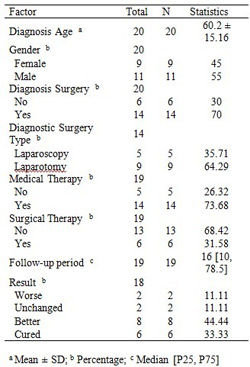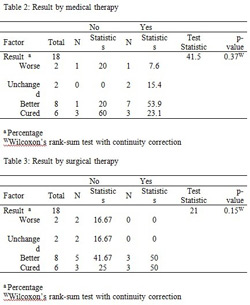|
Back to 2014 Annual Meeting Posters
Outcomes of Patients With Biopsy-Proven Sclerosing Mesenteritis
Mihir M. Shah*1, Kathryn Stackhouse2, Jacob a. Miller2, Yumeng LI2, Sricharan Chalikonda1
1General Surgery, Cleveland Clinic Foundation, Cleveland, OH; 2Cleveland Clinic Lerner College of Medicine, Cleveland Clinic, Cleveland, OH
Background:
Sclerosing mesenteritis (SM) is a rare, non-specific condition characterized by a variable amount of chronic mesenteric fibrosis, usually but not always involving the root of the mesentery. It has a variable presentation, from incidental finding to acute abdomen. Its rarity has limited the ability to investigate demographic and clinical features of the disease. Thus, treatment decisions are largely guided by anecdotal experience and small case studies. Treatment options include surgical removal and/or medical therapy including corticosteroids, immunosuppressive agents, colchicine, tamoxigen, progesterone, and thalidomide. Each of these treatments has been used with varying success. This study attempts to characterize the demographics and treatment algorithms of patients diagnosed with SM at our institution, and describe the long term outcomes of these patients.
Methods:
20 patients with biopsy-proven SM at a single institution were identified. Demographic and clinical characteristics were collected by review of the electronic medical record. Long-term follow-up was also characterized. Continuous variables were summarized using means and standard deviations, or median and interquartile ranges. Categorical variables were summarized using counts and percentages. Comparisons of ordinal variables between two groups were done using Wilcoxon's rank-sum test. All analyses were done using R software (Version 3.0.2, Vienna, Austria). A 5% level of significance was used for all testing.
Results:
20 patients with biopsy-proven sclerosing mesenteritis from the single institution were identified and followed for a median of 16 months. The mean age at diagnosis was 60.2 years. Demographic information is summarized in Table 1. 14 patients underwent medical therapy and 6 underwent surgical therapy. One patient received both surgical and medical therapy. There was no difference in outcome when comparing patients who did and did not receive medical therapy (Table 2). However, 10 of 13 patients who received medical therapy had improvement or total cure. Similar results were observed for patients who did or did not receive surgical therapy (Table 3). Interestingly, five of six patients who had therapeutic surgery had a small bowel resection for obstructive symptoms. All patients who had surgical therapy had improvement in their symptoms or total cure (Table 3).
Conclusion:
Though limited by power, this study revealed a trend that medical therapy is effective treatment for biopsy-proven sclerosing mesenteritis. However, when clinical findings indicate therapeutic surgery in patients with sclerosing mesenteritis, results are overwhelmingly positive with 100 percent of patients achieving symptomatic improvement or total cure.


Back to 2014 Annual Meeting Posters
|



